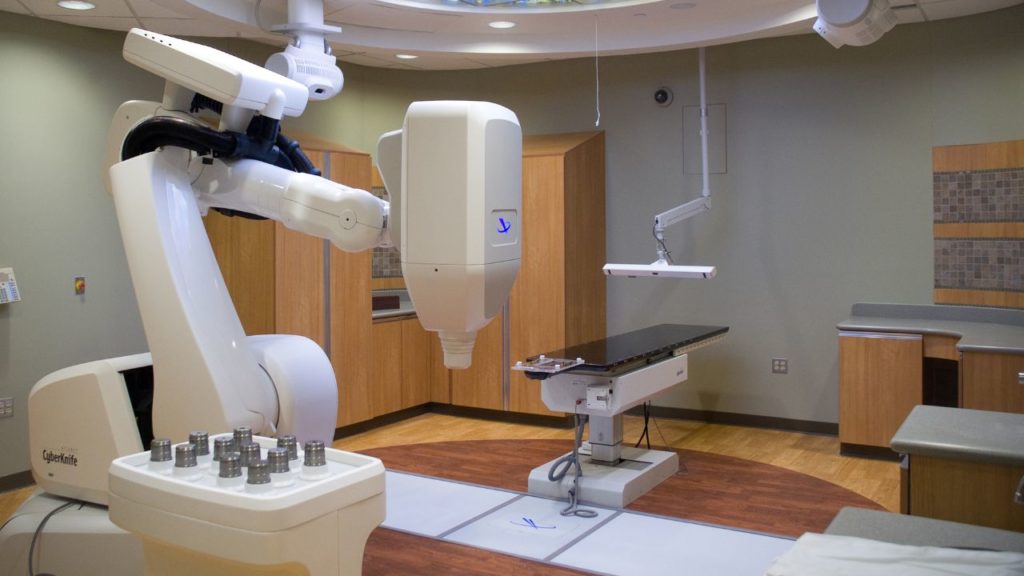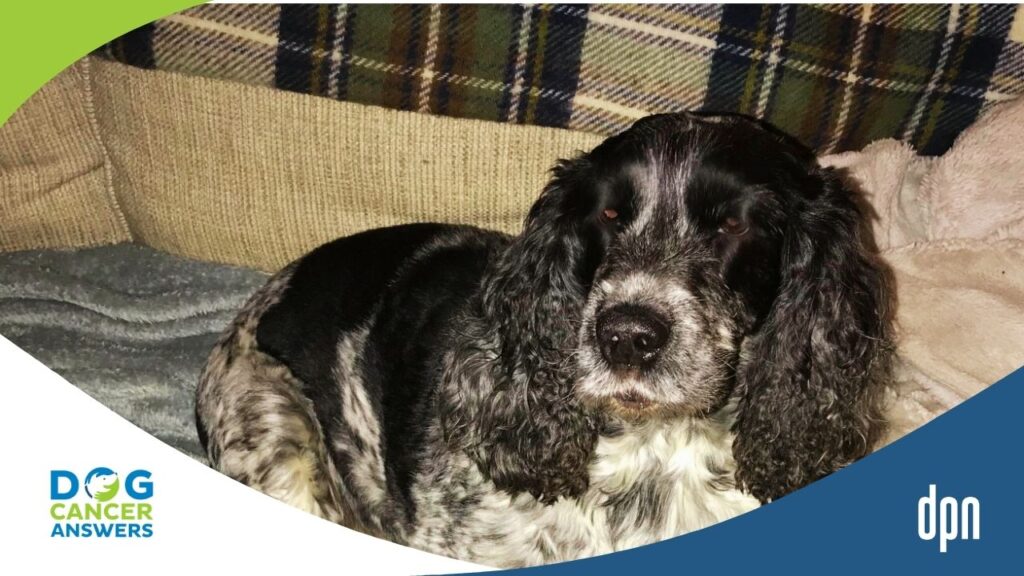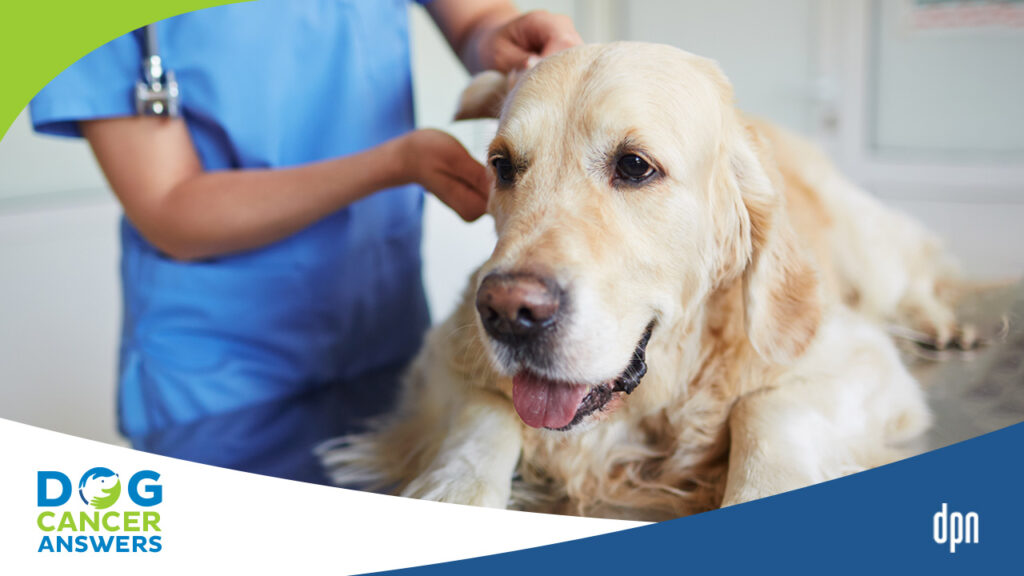[00:00:00] >> James Jacobson: Today on our special Exam Room Series, brain tumors, and what you need to know to help your dog.
[00:00:07] >> Announcer: Welcome to Dog Cancer Answers, where we help you help your dog with cancer. Here’s your host, James Jacobson.
[00:00:16] >> James Jacobson: Hello friend. Let me start off by saying, I’m sorry. I am sorry that you’re listening to this podcast.
[00:00:23] Sure, I know that it is an odd thing for a host to say in a welcome message, but the fact that you listening to my voice now probably means that you have a dog who has been diagnosed with a brain tumor. I have been there and I know what it’s like to have a dog who has cancer. And I also want to let you know that you’re in the absolute best place, because you’re in good company.
[00:00:46] Unfortunately, cancer is the number one killer of dogs, but there is a lot of hope. Dogs do not have an expiration date stamped on their forehead. There are so many things that you can do to help your dog after you get a brain tumor diagnosis. Now I’m lucky. My veterinarian is Dr. Demian Dressler, author of the bestselling book, The Dog Cancer Survival Guide.
[00:01:10] He’s a renowned authority on full spectrum approaches to treating dog cancer. And today you can come into his exam room and listen to what he would tell one of his clients whose dog was diagnosed with a brain tumor.
[00:01:25] >> Dr. Damien Dressler: So brain tumors in dogs are not common. They’re much less common than a lot of other cancer types. And I think one of the ways that brain tumors, most commonly show up is seizure disorders. In private practice many times, when a dog is developing a seizure problem and having seizures at home, even if it’s once in a while, first of all, it can be difficult to recognize that it’s a seizure because seizures are not always what you’d imagine.
[00:01:52] Sometimes a seizure is a dog just starts to act strange and walk into a wall or fall down, lose consciousness, something like that. That can be a partial seizure too. The first thing is that we’re having a seizure or is it some other problem? And then the second thing is, well, what’s causing that seizure? And the problem that we have with brain tumors is that it takes a lot to diagnose them because a lot of times we have to do CAT scans or MRIs.
[00:02:14] That’s not really always available in private practice. And then the second question is, well, what are we going to do if there’s a brain tumor? Now there are some referral centers that do brain surgery, and I wouldn’t really necessarily be thinking along those lines, unless you had a dog that was much shorter in age than it’s anticipated average life expectancy.
[00:02:34] And the reason for that is because if you have a 14 year old dog, it may be that after undergoing a very intensive type of treatment, that, that dog’s life expectancy is only six or 12 months more. So in The Dog Cancer Survival Guide, we talk about something called treatment plan analysis. And basically what that means is we say, okay, well, what does my dog get out of the proposed treatments that are being discovered and do I want to do that?
[00:02:59] How much longevity? What’s the cost to the animal and to me, in terms of discomfort, life quality, negative in terms of time, logistics, finances, and you really sit down and we say, well, okay, what are we looking at here? And we also have to take our dog’s age into consideration. And there’s a nice little chart that we use that has different ways of predicting an average life expectancy because the age of the animal is very relevant.
[00:03:25] So if we have a younger animal, maybe we want to be more aggressive. Maybe a shorter term treatment, even if it creates a negative life, quality is better to consider if we potentially have many years of life in front of us. So this is all part of what we call treatment plan analysis and it’s an important part of The Dog Cancer Survival Guide.
[00:03:44] Another thing I think people ought to realize is that brain tumors are very tough. We talked about the surgery, which is a rare option that’s offered. Other thing is that we can look at are certain types of chemo drugs that are capable of passing what’s called the blood-brain barrier. The brain is difficult to penetrate with drugs.
[00:04:01] That’s the problem. But there are a couple of options that can be used and let’s not forget all of the full spectrum tools that we have at our disposal, which can help to support the life quality in general, not only diet and supplements, but also lifestyle activities. And there is some research that’s done on the human side that we can apply to dogs. If we can eliminate things like stress, if we can eliminate things like isolation, if we can eliminate things like a sedentary lifestyle, sunshine exposure, these types of things, these can all make a really big difference. And we know this through not only the data, but also personal stories of people with cancer and also personal stories of those guardians who have been managing dog cancer and who have in the past, at least all very important tools and part of a comprehensive, full spectrum approach that can be used to get as much benefit as we can.
[00:04:56] >> James Jacobson: If you’d like to hear more about dog cancer and what you can do to help your dog now, I encourage you to pick up a copy of Dr. Dressler’s book, which just happens to be the sponsor of today’s episode and this entire special Exam Room Series here on Dog Cancer Answers. The name of this best-selling book is The Dog Cancer Survival Guide: Full Spectrum Treatments to Optimize Your Dog’s Life Quality and Longevity.
[00:05:22] The authors are Dr. Demian Dressler, who you just heard from, and Dr. Susan Ettinger, an oncologist in New York. And in a minute, I will tell you how to get their book at a discount. This book is considered the bible of dog cancer, and it covers so much information in an easy to understand, easy to reference guide.
[00:05:41] For example, the book covers everything that you need to know about conventional veterinary treatments, that’s surgery, chemotherapy, and radiation, including how to reduce their side effects. The most effective, non-conventional options, including botanical nutraceuticals, supplements, nutrition, and mind-body medicine.
[00:06:00] And the book helps you to analyze the options and develop a specific plan for your own dog, based on your dog’s type of cancer, your dog’s age, your financial budget, and your time constraints, as well as your personality. The Dog Cancer Survival Guide is available wherever fine books are sold, both online and in physical bookstores. It’s available either in paperback or as an e-book edition and the e-book is under $10. The website to get either the paperback or the e-book is www.DogCancerBook.com and you will save 10% if you use the promo code PODCAST, when you check out, you’ll save 10%. The website again, www.DogCancerBook.com. Use the promo code PODCAST for 10% off. That is www.DogCancerBook.com.
[00:06:50] I want to let you know that we have lots. Free helpful information on our podcast website, the URL is DogCancerAnswers.com. It’s where you can listen to or download our entire back catalog of episodes. It’s the best way to get the information that you need to help optimize your dog’s life quality and longevity.
[00:07:17] Do you have a question for a dog cancer veterinarian? Well, one of our veterinarians could answer your question on a future episode of Dog Cancer Answers. Please call our listener line and record your question. The telephone number is (808) 868-3200. That is (808) 868-3200. Or visit our website at DogCancerAnswers.com. With dog cancer you want to get relevant information as quickly as possible. So make sure you get the next episode of our podcast as soon as it’s released by subscribing to Dog Cancer Answers in Apple Podcast or your favorite podcast app. We’re also on Spotify as well as YouTube.
[00:08:01] That’s all for this episode in our Exam Room Series, I’d like to thank Dr. Demian Dressler for being our guest today. Until next time. I’m James Jacobson. From all of us here at Dog Cancer Answers and Dog Podcast Network, I wish you and your dog, a warm, Aloha.
[00:08:22] >> Announcer: Thank you for listening to Dog Cancer Answers. If you’d like to connect, please visit our website at DogCancerAnswers.com or call our listener line at (808) 868-3200. And here’s a friendly reminder that you probably already know. This podcast is provided for informational and educational purposes only.
[00:08:41] It’s not meant to take the place of the advice you receive from your dog’s veterinarian. Only veterinarians who examine your dog can give you veterinary advice or diagnose your dog’s medical condition. Your reliance on the information you hear on this podcast is solely at your own risk. If your dog has a specific health problem, contact your veterinarian.
[00:08:58] Also, please keep in mind that veterinary information can change rapidly. Therefore, some information may be out of date.







